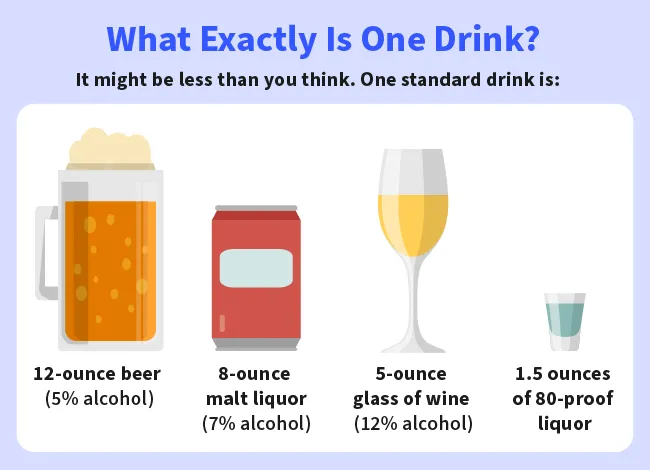Mimosas at brunch. A beer while watching the game. Or just a glass of wine with dinner at home. Is alcohol ever OK if you have high blood pressure?
It comes down to this:
- Is your high blood pressure, which doctors call hypertension, under control?
- How often – and how much – do you drink?
Here’s what to consider before you raise your glass.
Is Your High Blood Pressure Under Control?
An occasional drink may not make a significant difference if your high blood pressure is under good control with medication and/or healthy habits like diet and exercise.
“In limited amounts, it's probably OK based on the data that we have,” says cardiologist Luke Laffin, MD, co-director of the Center for Blood Pressure Disorders at the Cleveland Clinic in Ohio.
That could be a glass of wine no more than a few times a week, as long as that glass isn’t supersized. And that’s a crucial piece of information: What do you consider a “glass” of wine, or a “can” or “bottle” of beer? A large wine glass can easily hold two or more standard servings of wine. And beer these days is different than, say, 30 years ago. Drinking two 16-ounce IPAs at 8% alcohol by volume (ABV) is the equivalent of four-plus 12-ounce cans of “regular” 4%-5% ABV domestic beer (such as Miller Lite or Coors Light).

How much and how often you drink is key, agrees cardiologist Nieca Goldberg, MD, of NYU Langone Health. “If you're going out to a wedding or for dinner with friends, that's fine,” she says. “But it’s not something that you want to be doing on an everyday basis.”
If Your High Blood Pressure Isn’t Controlled
Normal blood pressure is less than 120/80. Is yours higher than that and not yet under good control? Then you may want to cut back or not drink at all until you get those numbers down.
“I generally advise [patients] to try to avoid alcohol intake until we can get the blood pressure controlled,” Goldberg says.
Working with your cardiologist and focusing on your lifestyle – like the foods you eat, exercising, and avoiding alcohol – are key, Goldberg says. Some people may also need medication to help manage their blood pressure.
Laffin recommends that patients with borderline or uncontrolled high blood pressure at least cut back on alcohol if they’re trying different blood pressure meds or want to treat it with lifestyle changes alone.
Not Sure About Your Blood Pressure?
If you don’t know if your blood pressure is in the normal range, your doctor can test it. Or you can check it yourself with a home blood pressure monitor or at some pharmacies for free.
Keep in mind that high blood pressure usually doesn’t have symptoms – and is very common. Almost half of all U.S. adults have high blood pressure, and only 1 in 4 of them have it under good control, according to the CDC.
A ‘Toxin to the Heart’?
You may have seen headlines that linked having one drink a day to a greater rise in blood pressure with age, compared to people who don’t drink at all. That’s not certain yet, since the finding, published in the journal Hypertension, was based on how much people said they drink, and the blood pressure gap between the teetotalers and those who drank only a little alcohol was pretty small.
But it’s clear that drinking too much, over time, is bad news for your blood pressure and your heart.
“Heavy alcohol use is a direct toxin to the heart,” Goldberg says. She notes that it can cause an enlarged heart (alcoholic cardiomyopathy), which weakens your heart and makes it harder to pump blood. And if you drink heavily and quickly, Goldberg says it can set you up for heart arrhythmias, which are abnormal or irregular heartbeats.
Drinking too much can also trigger sleep problems and lead to weight gain, which can harm your blood pressure, heart health, and your whole body. Over time, heavy drinking also makes many other serious health problems more likely, including heart disease, heart failure, liver disease, alcohol use disorder, and certain types of cancer.
Women should be especially cautious about alcohol, Goldberg says, as they may be more likely than men to develop health problems, particularly among young or middle-aged women who have eight or more drinks a week.
“Women might be more susceptible to the negative effects of alcohol,” Goldberg says, noting that alcohol breaks down more slowly in women than in men.
‘No Amount of Alcohol is Safe’
If you hope that moderate drinking is good for you, that idea is falling out of favor.
Some older studies suggested that red wine might be good for heart health. But doctors now believe that alcohol doesn’t serve up any heart benefits.
“I do counsel patients on … recent data that suggests no amount of alcohol is safe,” Laffin says. He reminds them of the American Heart Association (AHA) and American College of Cardiology (ACC) definitions of moderate drinking, which are:
- No more than one drink per day for women
- No more than two drinks per day for men
If you don’t drink alcohol, cardiologists don’t recommend that you start.

